您好,登錄后才能下訂單哦!
您好,登錄后才能下訂單哦!
小編給大家分享一下Spring MVC工作原理的示例分析,相信大部分人都還不怎么了解,因此分享這篇文章給大家參考一下,希望大家閱讀完這篇文章后大有收獲,下面讓我們一起去了解一下吧!
應用示例
在講工作原理之前,我們先看一個簡單的spring mvc(ssm)示例,以及實現的效果
工程代碼地址:ssm-web
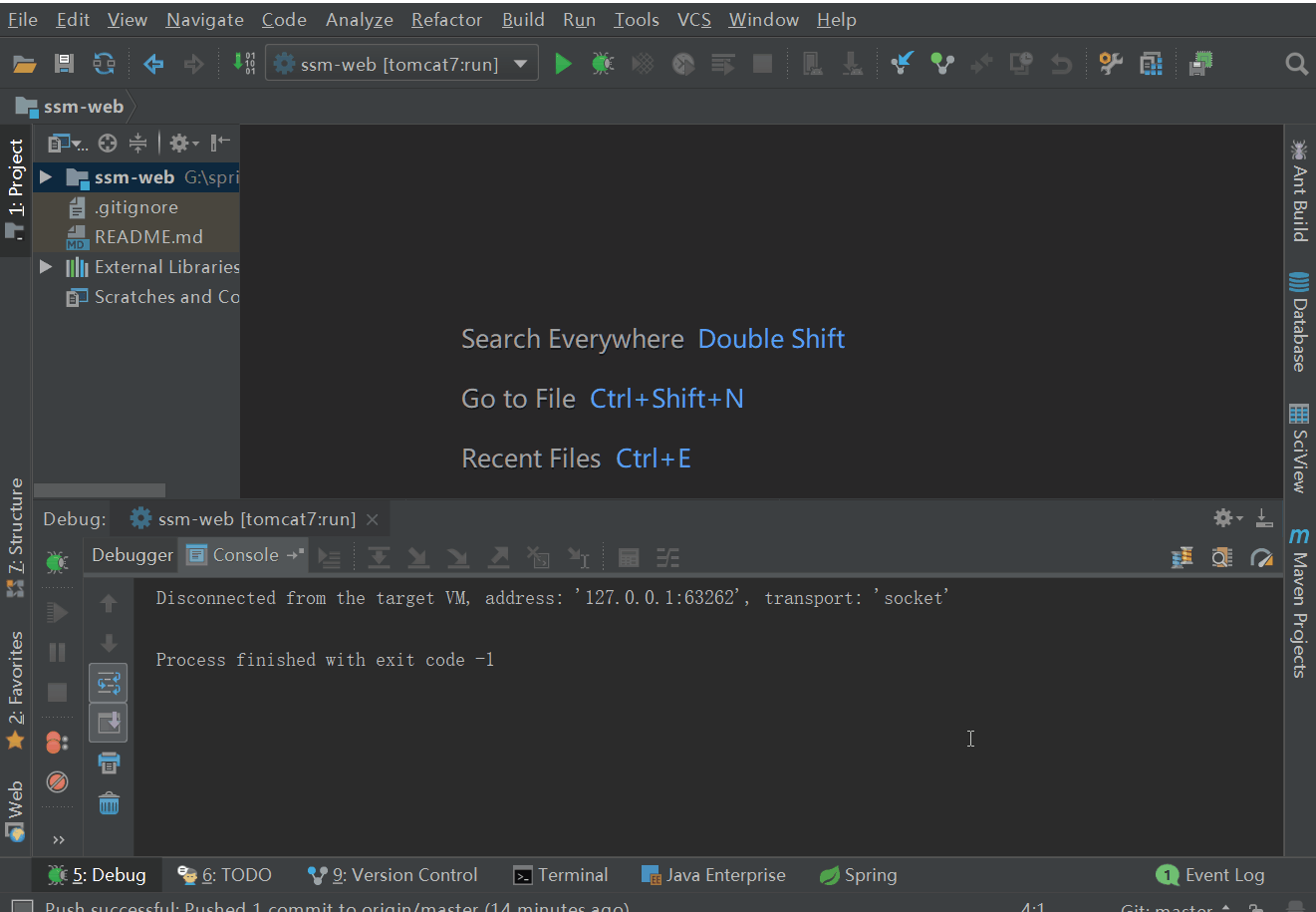
工程結構與效果如上所示,我們不做過多的探究,我們打起精神往下看本篇的重點
工作原理
準備 - 資源的加載與初始化
1、DispatcherServlet 靜態初始化
DispatcherServlet中有如下靜態塊
static {
// Load default strategy implementations from properties file.
// This is currently strictly internal and not meant to be customized
// by application developers.
try {
ClassPathResource resource = new ClassPathResource(DEFAULT_STRATEGIES_PATH, DispatcherServlet.class);
defaultStrategies = PropertiesLoaderUtils.loadProperties(resource);
}
catch (IOException ex) {
throw new IllegalStateException("Could not load 'DispatcherServlet.properties': " + ex.getMessage());
}
}這里會將DispatcherServlet.properties中的內容讀取到DispatcherServlet的屬性:private static final Properties defaultStrategies中,DispatcherServlet.properties內容如下
# Default implementation classes for DispatcherServlet's strategy interfaces. # Used as fallback when no matching beans are found in the DispatcherServlet context. # Not meant to be customized by application developers. org.springframework.web.servlet.LocaleResolver=org.springframework.web.servlet.i18n.AcceptHeaderLocaleResolver org.springframework.web.servlet.ThemeResolver=org.springframework.web.servlet.theme.FixedThemeResolver org.springframework.web.servlet.HandlerMapping=org.springframework.web.servlet.handler.BeanNameUrlHandlerMapping,\ org.springframework.web.servlet.mvc.annotation.DefaultAnnotationHandlerMapping org.springframework.web.servlet.HandlerAdapter=org.springframework.web.servlet.mvc.HttpRequestHandlerAdapter,\ org.springframework.web.servlet.mvc.SimpleControllerHandlerAdapter,\ org.springframework.web.servlet.mvc.annotation.AnnotationMethodHandlerAdapter org.springframework.web.servlet.HandlerExceptionResolver=org.springframework.web.servlet.mvc.annotation.AnnotationMethodHandlerExceptionResolver,\ org.springframework.web.servlet.mvc.annotation.ResponseStatusExceptionResolver,\ org.springframework.web.servlet.mvc.support.DefaultHandlerExceptionResolver org.springframework.web.servlet.RequestToViewNameTranslator=org.springframework.web.servlet.view.DefaultRequestToViewNameTranslator org.springframework.web.servlet.ViewResolver=org.springframework.web.servlet.view.InternalResourceViewResolver org.springframework.web.servlet.FlashMapManager=org.springframework.web.servlet.support.SessionFlashMapManager
指定了DispatcherServlet策略接口的默認實現,后續DispatcherServlet初始化策略的時候會用到
2、interceptor定義的加載
spring啟動過程中會調用InterceptorsBeanDefinitionParser的parse方法來解析出我們自定義的interceptor定義,封裝成MappedInterceptor類型的bean定義,并放到spring容器中;我們可以簡單的認為spring容器中已經存在了我們自定義的interceptor的bean定義
3、DispatcherServlet初始化策略:initStrategies
DispatcherServlet的繼承圖如下

DispatcherServlet是一個Servlet,tomcat啟動過程中會調用其init方法,一串的調用后,會調用DispatcherServlet的initStrategies方法
protected void initStrategies(ApplicationContext context) {
initMultipartResolver(context);
initLocaleResolver(context);
initThemeResolver(context);
initHandlerMappings(context);
initHandlerAdapters(context);
initHandlerExceptionResolvers(context);
initRequestToViewNameTranslator(context);
initViewResolvers(context);
initFlashMapManager(context);
}實例化步驟1中的默認實現,并填充到DispatcherServlet各個屬性值中
4、DefaultAnnotationHandlerMapping的攔截器初始化
DispatcherServlet.properties種指定了兩個默認的HandlerMapping:BeanNameUrlHandlerMapping、DefaultAnnotationHandlerMapping,這兩者的類繼承圖如下(我們暫時只關注DefaultAnnotationHandlerMapping)

DefaultAnnotationHandlerMapping間接實現了ApplicationContextAware,那么在DefaultAnnotationHandlerMapping實例初始化過程中,會調用setApplicationContext(ApplicationContext applicationContext)方法,一串調用后,會來到AbstractUrlHandlerMapping的initApplicationContext()
@Override
protected void initApplicationContext() throws BeansException {
extendInterceptors(this.interceptors);
detectMappedInterceptors(this.mappedInterceptors);
initInterceptors();
}初始化了DefaultAnnotationHandlerMapping的攔截器:interceptor
我們來看下具體的初始化過程,看看上面的順序是否只是我個人的臆想?
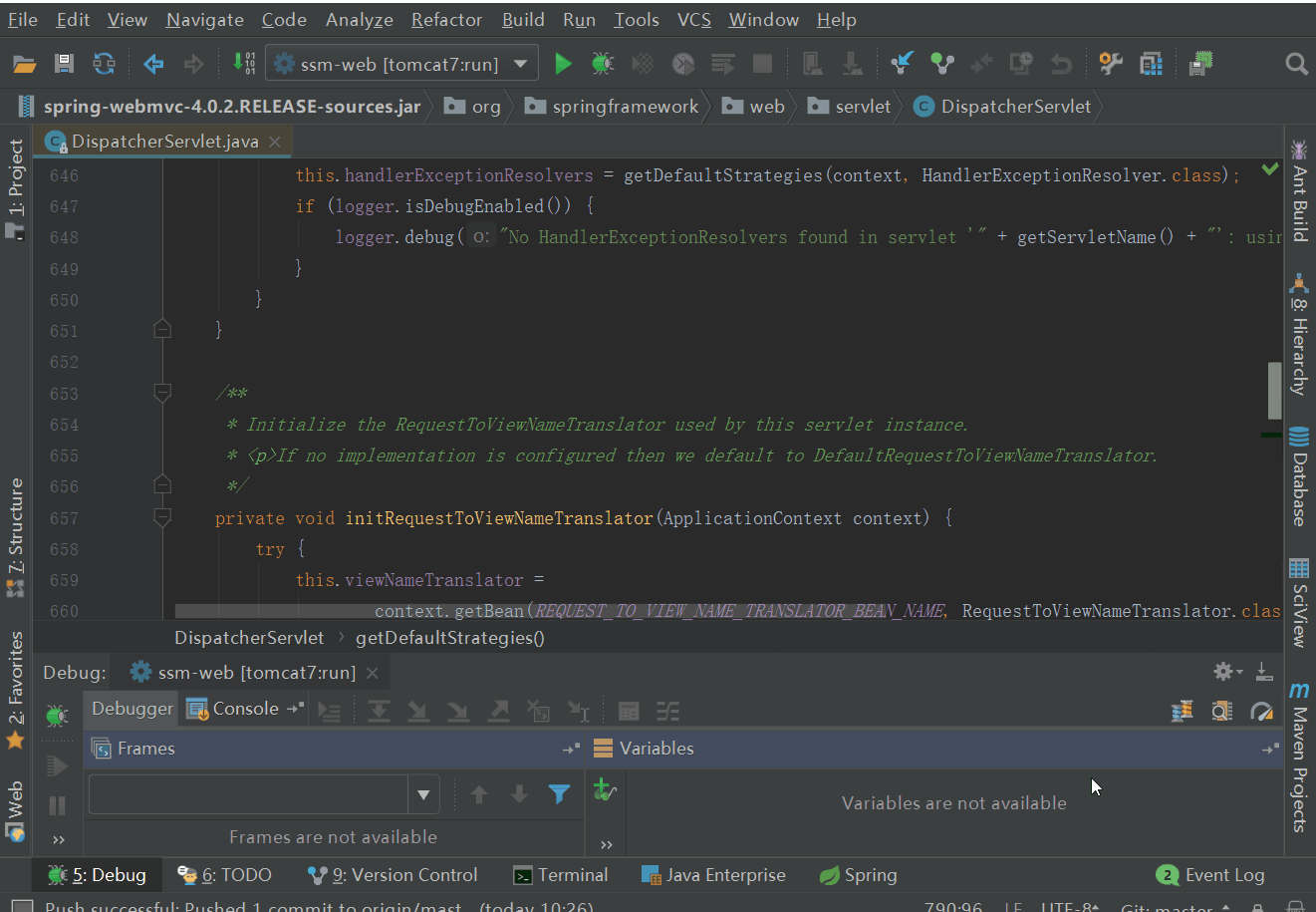
可以看到,初始化順序就是我們上面說的,不是我個人的意淫;此時的DefaultAnnotationHandlerMapping中有我們自定義的MyInterceptor。初始化過程我們需要關注的就是上述這些,下面我們一起看看具體請求的過程
請求的處理
請求從servlet的service開始,一路到DispatcherServlet的doDispatch,如下圖
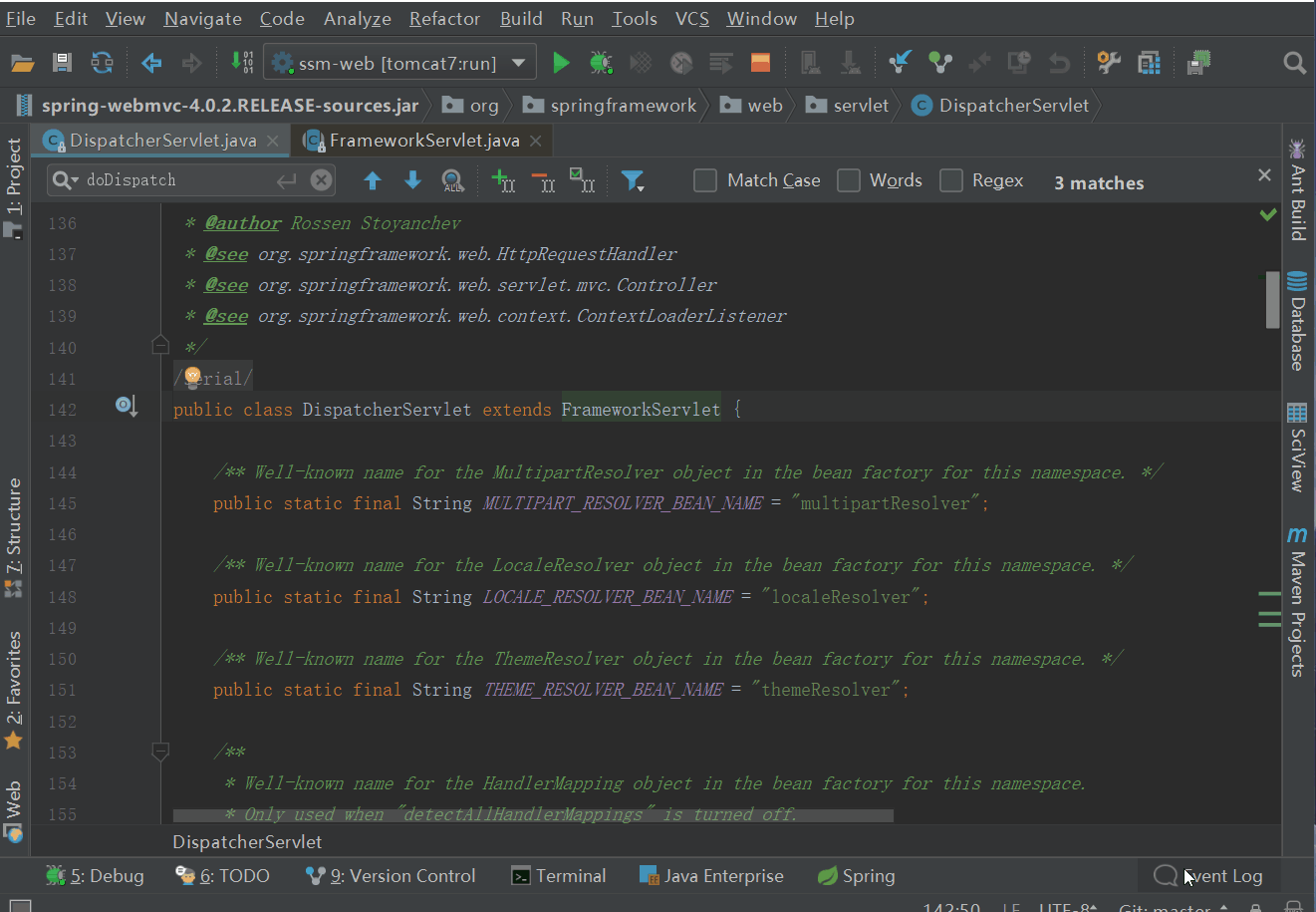
doDispatch
/**
* Process the actual dispatching to the handler. 將請求分發到具體的handler,也就是我們的controller
* <p>The handler will be obtained by applying the servlet's HandlerMappings in order.
* The HandlerAdapter will be obtained by querying the servlet's installed HandlerAdapters
* to find the first that supports the handler class.
* <p>All HTTP methods are handled by this method. It's up to HandlerAdapters or handlers
* themselves to decide which methods are acceptable.
* @param request current HTTP request
* @param response current HTTP response
* @throws Exception in case of any kind of processing failure
*/
protected void doDispatch(HttpServletRequest request, HttpServletResponse response) throws Exception {
HttpServletRequest processedRequest = request;
HandlerExecutionChain mappedHandler = null;
boolean multipartRequestParsed = false;
WebAsyncManager asyncManager = WebAsyncUtils.getAsyncManager(request);
try {
ModelAndView mv = null;
Exception dispatchException = null;
try {
processedRequest = checkMultipart(request);
multipartRequestParsed = processedRequest != request;
// Determine handler for the current request. 決定哪個handler來處理當前的請求
// mappedHandler是由handler和interceptor集合組成的一個執行鏈,有點類似FilterChain
mappedHandler = getHandler(processedRequest);
if (mappedHandler == null || mappedHandler.getHandler() == null) {
noHandlerFound(processedRequest, response);
return;
}
// Determine handler adapter for the current request. 決定哪個adapter來處理當前的請求
// handlerMapping是找出適配的handler,而真正回調handler的是adapter
HandlerAdapter ha = getHandlerAdapter(mappedHandler.getHandler());
// Process last-modified header, if supported by the handler.
String method = request.getMethod();
boolean isGet = "GET".equals(method);
if (isGet || "HEAD".equals(method)) {
long lastModified = ha.getLastModified(request, mappedHandler.getHandler());
if (logger.isDebugEnabled()) {
String requestUri = urlPathHelper.getRequestUri(request);
logger.debug("Last-Modified value for [" + requestUri + "] is: " + lastModified);
}
if (new ServletWebRequest(request, response).checkNotModified(lastModified) && isGet) {
return;
}
}
// handler的前置處理,也就是調用適配當前url的interceptor的preHandler方法
if (!mappedHandler.applyPreHandle(processedRequest, response)) {
return;
}
try {
// Actually invoke the handler. 真正調用handler
mv = ha.handle(processedRequest, response, mappedHandler.getHandler());
}
finally {
if (asyncManager.isConcurrentHandlingStarted()) {
return;
}
}
applyDefaultViewName(request, mv);
// handler的后置處理,也就是調用適配當前url的interceptor的postHandler方法
mappedHandler.applyPostHandle(processedRequest, response, mv);
}
catch (Exception ex) {
dispatchException = ex;
}
// 處理handler返回的結果,會調用適配當前url的interceptor的afterCompletion方法
// 這里會將響應結果返回給請求者
processDispatchResult(processedRequest, response, mappedHandler, mv, dispatchException);
}
catch (Exception ex) {
triggerAfterCompletion(processedRequest, response, mappedHandler, ex);
}
catch (Error err) {
triggerAfterCompletionWithError(processedRequest, response, mappedHandler, err);
}
finally {
if (asyncManager.isConcurrentHandlingStarted()) {
// Instead of postHandle and afterCompletion
mappedHandler.applyAfterConcurrentHandlingStarted(processedRequest, response);
return;
}
// Clean up any resources used by a multipart request.
if (multipartRequestParsed) {
cleanupMultipart(processedRequest);
}
}
}handlerMapping具體如何找到匹配當前url的handler(一般而言就是我們的controller)、handlerAdapter具體如何回調真正的handler,有興趣的可以自行去跟下,我就不跟了。我們具體看下processDispatchResult(processedRequest, response, mappedHandler, mv, dispatchException); 這個與我們最初的疑問有關
processDispatchResult
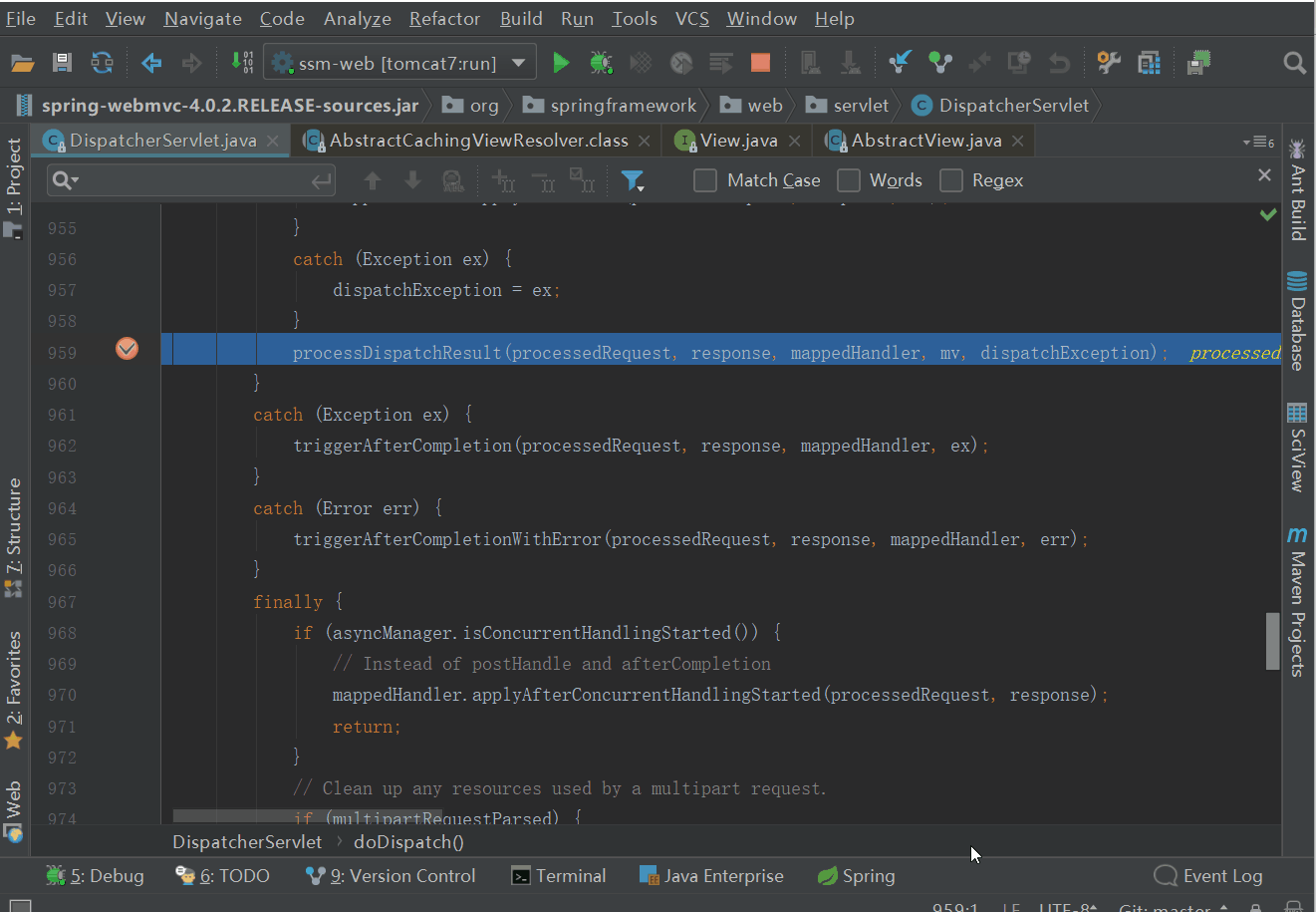
可以看到model中的persons會被設置到request的attributes中,然后轉發請求到show_person.jsp,轉發過程中request作用域的變量仍然有效,所以show_person.jsp中的jstl標簽和el表達式能夠取到persons變量,最后將show_person.jsp中的內容填充好之后的靜態內容返回給請求者;至此就完成了一次請求的響應
問題解答
回到我們開篇的疑問:Spring mvc是何時、何地、如何將Model中的屬性綁定到哪個作用域?想必大家已經知道答案了
Controller中的model、ModelMap的注入由spring mvc完成,這個不是請求傳入的參數,用于綁定變量到Servlet作用域;默認情況下,在DispatcherServlet調用了真正的handler之后,將結果返回給請求者的過程中,將model、modelMap中的變量設置到了request的attributes中,轉發的過程中,request中的變量仍然有效,所以show_person.jsp中能取到persons這個變量,自此疑問得到解答
總結
1、Spring MVC工作原理圖
圖是用的別人的,具體是誰的我也不記得了(捂臉)
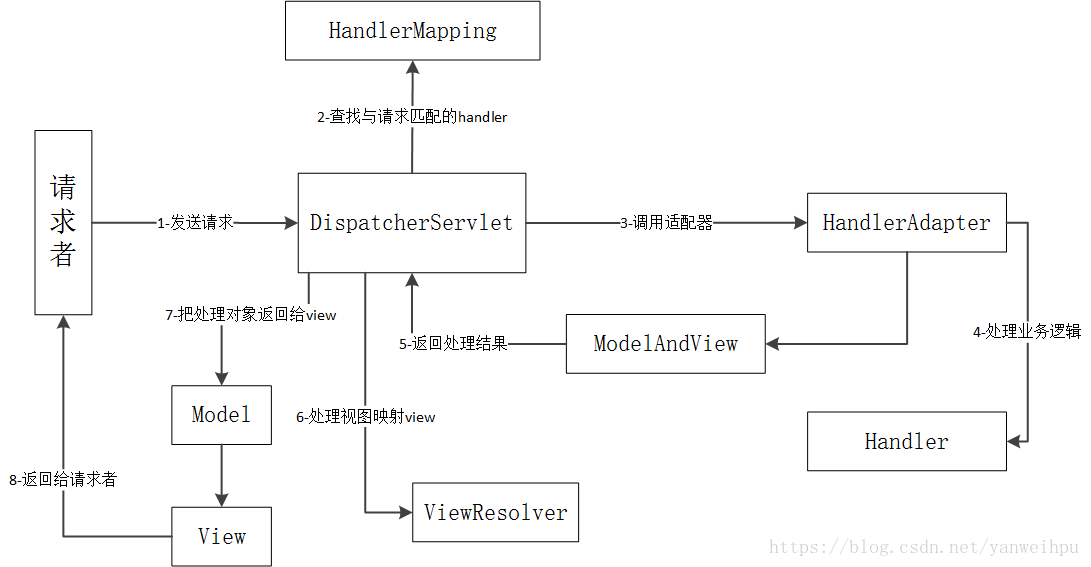
以上是“Spring MVC工作原理的示例分析”這篇文章的所有內容,感謝各位的閱讀!相信大家都有了一定的了解,希望分享的內容對大家有所幫助,如果還想學習更多知識,歡迎關注億速云行業資訊頻道!
免責聲明:本站發布的內容(圖片、視頻和文字)以原創、轉載和分享為主,文章觀點不代表本網站立場,如果涉及侵權請聯系站長郵箱:is@yisu.com進行舉報,并提供相關證據,一經查實,將立刻刪除涉嫌侵權內容。